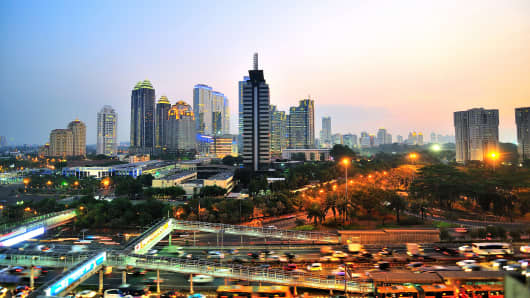Indonesia has emerged as a "darling of investors" attracting record inflows over the past few years attracted in part by its huge and cheap labor force. However, Southeast Asia's largest economy is going to implement double-digit wage hikes next year which raises the question – Is the country's position as a hot spot for foreign investment under threat.
Following growing protests last month, the governor of the country's capital city Jakarta, agreed to raise its monthly minimum wage for 2013 by 44 percent to $230, marking a shift in bargaining power of workers.
(Read more: Who Is Asia's New Darling of Investors? )
This comes on the heels of similar moves earlier in the month by six other provincial governments who approved a hike in minimum wages of up to 26 percent for next year - significantly higher than the 10 percent average seen this year - and other provinces are expected to follow suit soon.
The large jump in labor costs has caught many business owners off guard, with two large business lobby groups last week calling for the wage hike in Jakarta to be reviewed.
Rishi, (who only wanted to be known by his first name) manages his family's synthetic yarn manufacturing factory located a few hours drive from Jakarta, in Bandung. He told CNBC that his business will take a sizable hit from the mandatory 25 percent hike in minimum wage next year.
"Yarn spinning is a labor intensive industry, a 25 percent increase in wages can make a significant dent to our bottom line, especially when you have 3,000 plus employees," he said.
"Wage rates usually rise on a steady basis in line with inflation, which is factored in our financial projections, however a sudden 25 percent will have to be absorbed by the company as a cost," Rishi added. He noted that the yarn industry is highly commoditized, with prices based on global markets, making it difficult to pass on extra costs to buyers.
Investment Will Continue
While higher wages will dent the profitability of existing business and narrow Indonesia's cost advantage over its Asian peers - the monthly minimum wage in Bangkok is $195, for example - economists said the rise in labor costs will not overturn the country's foreign direct investment (FDI) story.
FDI in Indonesia leaped 22 percent in the third quarter from a year earlier to a record high $5.9 billion.
"For manufacturing, the story is not over. There is still a wide minimum wage discrepancy between regions which allow room to maneuver or relocate within the country," said Helmi Arman, Indonesia economist at Citi. In regions such as North Sumatra, for example, the minimum wage will be raised to $135 next year.
For capital intensive industries such as metals, autos and chemicals – which have contributed to the recent strong growth in FDI – Arman said average labor costs make up just 3 percent of the goods produced and is therefore unlikely to deter new investors.
Consumption Boon
According to Su Sian Lim, ASEAN economist at HSBC, the rise in wages will be a boon for foreign investment, particularly in the consumption sector.
"FDI is drawn to Indonesia for reasons beyond cheap labor. Its population of 240 million represents not just a resource, but a significant market. Rising incomes, helped along by minimum wage hikes, only raises its allure," she said.
Thailand, which lifted wages across the country by 36-40 percent in April this year, has seen a considerable strengthening in private consumption as a result, Lim said.
Private consumption in the country rose 2.2 percent in the third quarter, from the previous three months,compared to a rise of 0.9 percent in the second quarter.
"This bodes very positively for Indonesian consumption. As it stands, consumption has already been growing at above trend so far this year, the impulse from a larger than usual minimum wage hike next year could fuel an even faster rise," she said.
Regional Trend
Indonesia is not the only country in the region that has come under pressure to raise wages. Malaysia is set to introduce minimum wages for the first time in 2013, while Vietnam is set to increase its minimum wage by 25-30 percent for the private sector next year.
While wages in the region are rising, they continue to remain well below that of the world's manufacturing hub China. Average salaries in the coastal regions of the mainland, for example, are still 60 percent higher than those in Jakarta, according to data from Citi.
Hak Bin Chua, ASEAN economist at Bank of America Merrill Lynch, said he is not worried about the impact this will have on the region's competitiveness.
"Threat from minimum wages on the region's competitiveness is not a major risk…Minimum wages might actually do some good by reducing wage inequality and encouraging greater labor participation," Chua wrote.



